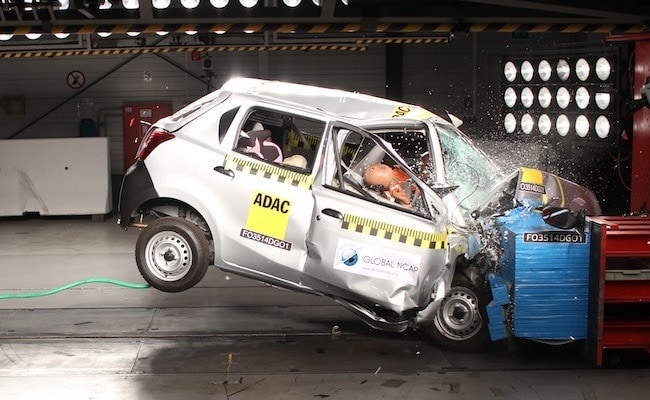Global NCAP Asks For Withdrawal of Datsun Go From India

Highlights
The recent revelations of the second round of crash tests for Indian made cars, Global NCAP - the safety watchdog - created quite a storm in India. Now Global NCAP has decided to ask Nissan Motor CO to withdraw the Datsun Go from the Indian market. In a sensational and unprecedented move, the Chairman of Global NCAP - Max Mosely, has written to Renault - Nissan CEO Carlos Ghosn saying, "As presently engineered the Datsun Go will certainly fail to pass the United Nation's frontal impact regulation. In these circumstances I would urge Nissan to withdraw the Datsun Go from sale in India pending an urgent redesign of the car's body-shell."
The Datsun Go was crashed in a frontal collision test, at the ADAC crash-testing facility in Landsberg, Germany, where it received a zero-star rating. (Read: NDTV report on the Go test) The Global NCAP test showed the Go as not just having the lack of passive safety equipment like airbags and ABS (anti-lock braking), but also an unstable body shell lacking structural integrity. This according to Global NCAP means that an addition of an airbag would be redundant.

The Go was launched in India earlier this year, as Datsun's first global product when Nissan revived the brand. Datsun is currently positioned as an entry-level and frugal brand with cars made specifically for certain markets only - India, Indonesia, Russia and South Africa. Exports of the made-in-India Go to South Africa, are meant to begin this December.
Global NCAP further believes that it is justified in addressing this directly to Mr Ghosn in his capacity as President of the European Car Manufacturers Association. Max Mosely says, "He (Carlos Ghosn) should now demonstrate leadership both in Nissan and on behalf of the vehicle industry generally that corresponds to the UN's legitimate expectation that automobile safety should be improved during the Decade of Action."
It must be noted that Global NCAP has no jurisdiction or powers - either globally or in India - to demand that the withdrawal of any car model is in fact carried out. It is merely a recommendation it is making to the company. NDTV has sought a direct response from Mr Ghosn's office, however, Nissan India had told NDTV earlier this week that it was studying the results of the crash test. A company spokesperson had added, "Datsun GO meets required local vehicle regulations in India. Datsun GO was developed with a strong intention to deliver the best adapted solutions to the local conditions, from best in class braking and good visibility to durability, seat comfort and reduced motion sickness - all being taken as a package aim to decrease potential risk of road accidents. Safety is important and is a key issue in India. Automotive regulation standards in fast-growing countries are constantly evolving and as a global manufacturer, we are willing to adopt as well as help evolve standards in vehicular safety standards."
It was in January that NDTV had broken the story of the first round of crash testing under the Global NCAP's Safer Cars For India programme. (Watch: The NDTV report on the first crash tests) At the time, 5 popular models - Maruti Suzuki Alto 800, Hyundai i10, Ford Figo, Volkswagen Polo, and the Tata Nano had been tested. All had received zero-star adult protection ratings. VW India then made airbags standard on the Polo, and subsequently earned a four-star safety rating. In November, results of the second round of tests have been released, which gave the Datsun Go and Maruti Suzuki Swift a zero-star rating as well.
Last Updated on November 6, 2014















